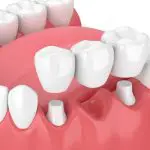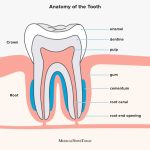Why Do Teeth Randomly Hurt? Understanding the Causes and Remedies

Teeth are an essential part of our body, and they play a crucial role in our daily lives. They help us chew food, articulate words and maintain our facial structure. However, sometimes teeth can randomly hurt, causing discomfort and pain that interferes with our daily activities. It can be a frustrating experience as it disrupts our routine and affects our mood. Understanding the reasons behind this pain and the remedies available to alleviate it can help us manage the situation better. There can be various reasons why teeth randomly hurt, and it is essential to identify the underlying cause to determine the appropriate treatment. Some common causes of toothache can be cavities, gum disease, tooth sensitivity, cracked or broken teeth, and teeth grinding. These factors can lead to inflammation, nerve damage, or infection, causing discomfort and pain. While some of these issues can be resolved by good oral hygiene practices, others require professional dental care. Therefore, it is crucial to diagnose the root cause of the pain and seek appropriate treatment to prevent further damage and complications.
Teeth pain is a common dental problem that affects people of all ages. The pain can range from mild discomfort to excruciating pain that can interfere with daily activities. Teeth pain can occur randomly without any apparent reason, causing anxiety and discomfort. Understanding the causes of teeth pain is essential in finding the right treatment or remedy. Some of the common causes include tooth decay, gum disease, dental trauma, and tooth sensitivity. Remedies for teeth pain range from over-the-counter pain relievers to home remedies such as saltwater rinses, clove oil, and cold compresses. Seeking dental care at the earliest sign of teeth pain is crucial to prevent complications and maintain good oral health.
It’s no secret that tooth pain can be incredibly uncomfortable and disruptive to daily life, but understanding the causes and remedies can help alleviate the discomfort. Tooth pain can be caused by a variety of factors, including tooth decay, gum disease, tooth fractures, and dental abscesses. Identifying the root cause of the pain is crucial in finding an appropriate solution. Remedies can range from simple at-home treatments, such as saltwater rinses and over-the-counter pain relievers, to more involved dental procedures, such as root canals and extractions. A better understanding of tooth pain can lead to timely and effective treatment, ultimately improving overall oral health and quality of life.
Tooth Decay
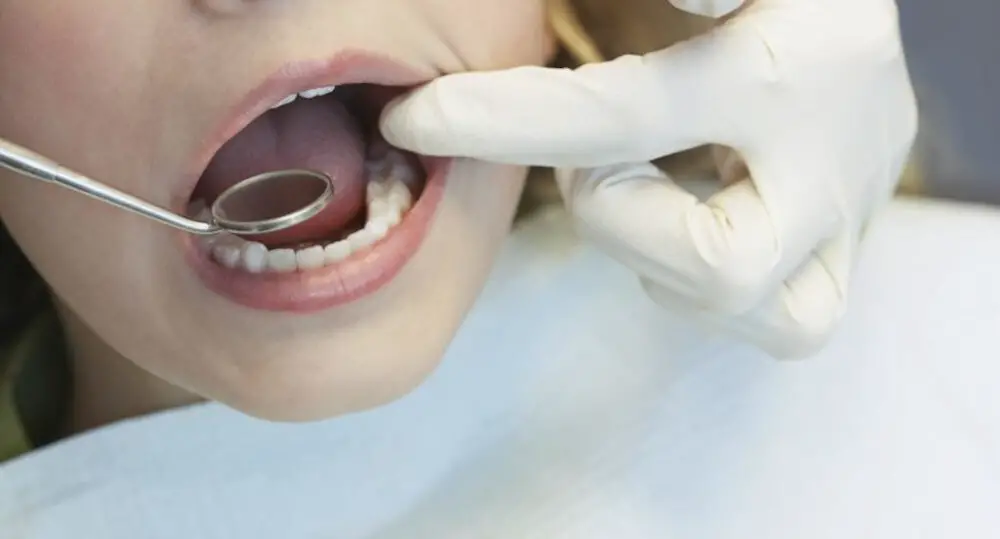
Tooth decay is one of the most common dental problems that people experience, causing pain and discomfort in the affected teeth. It is caused by the build-up of plaque and bacteria on the teeth, which can eat away at the enamel and expose the sensitive dentin underneath. Factors such as poor oral hygiene, a diet high in sugar and carbohydrates, and dry mouth can all contribute to the development of tooth decay. In its early stages, tooth decay may not cause any symptoms, but as it progresses, it can lead to tooth sensitivity, pain, and even infection. Treatment for tooth decay typically involves removing the affected areas of the tooth and repairing the damage with fillings or other restorative procedures. Preventing tooth decay is essential for maintaining good dental health. Brushing at least twice a day, flossing daily, and using mouthwash can help remove plaque and bacteria from the teeth and prevent the development of decay. Eating a balanced diet that is low in sugar and carbohydrates can also help reduce the risk of tooth decay. Regular dental check-ups and cleanings are also important for detecting and treating any early signs of decay before they can progress into more serious problems. By taking proper care of your teeth and practicing good oral hygiene habits, you can help prevent tooth decay and keep your smile healthy and pain-free.
Tooth decay, also known as dental caries, is a common dental problem that occurs when bacteria in the mouth produce acid that erodes the tooth enamel. Poor dental hygiene, sugary foods and drinks, and certain medical conditions can increase the risk of tooth decay. The initial signs of tooth decay may include sensitivity to hot or cold temperatures and mild pain. As the condition worsens, the tooth may become discolored, develop cavities, or even crack or break. If left untreated, tooth decay can lead to serious dental problems, such as gum disease, tooth loss, and abscesses. Treatment for tooth decay typically involves removing the decayed portion of the tooth and filling it with a dental material, such as composite resin or amalgam. In severe cases, a root canal procedure may be necessary to save the tooth.
Tooth decay is the process by which bacteria in the mouth break down sugars and produce acid that erodes the tooth enamel, leading to cavities. Poor oral hygiene is one of the main causes of tooth decay, as it allows bacteria to accumulate and thrive in the mouth. Other factors that contribute to tooth decay include a diet high in sugar and carbohydrates, dry mouth, acid reflux, and genetics. Additionally, certain medications and medical conditions can weaken the enamel and make teeth more susceptible to decay. Regular dental check-ups, brushing twice a day with fluoride toothpaste, and reducing sugar intake can help prevent tooth decay and maintain good oral health.
Tooth decay is a common dental problem that can cause severe pain and discomfort. The symptoms of tooth decay include sensitivity to hot or cold foods and drinks, pain when biting or chewing, visible holes or pits in the teeth, and bad breath. In some cases, tooth decay can even lead to a tooth abscess, which can cause fever, severe pain, and swollen gums. If you experience any of these symptoms, it is essential to visit a dentist as soon as possible. A dentist can diagnose the problem and recommend the appropriate treatment to prevent further damage to your teeth.
Tooth decay is a common dental problem that can cause pain and discomfort. Fortunately, there are several remedies for tooth decay. The most effective remedy is to visit a dentist regularly for check-ups and cleanings. If tooth decay is detected early, it can be treated with a simple filling. However, if the decay has progressed, a root canal or tooth extraction may be necessary. In addition to professional dental care, there are also home remedies that can help prevent tooth decay. These include brushing and flossing regularly, using fluoride toothpaste, avoiding sugary and acidic foods and drinks, and using mouthwash. By following these remedies, individuals can maintain good dental health and prevent tooth decay.
Gum Disease
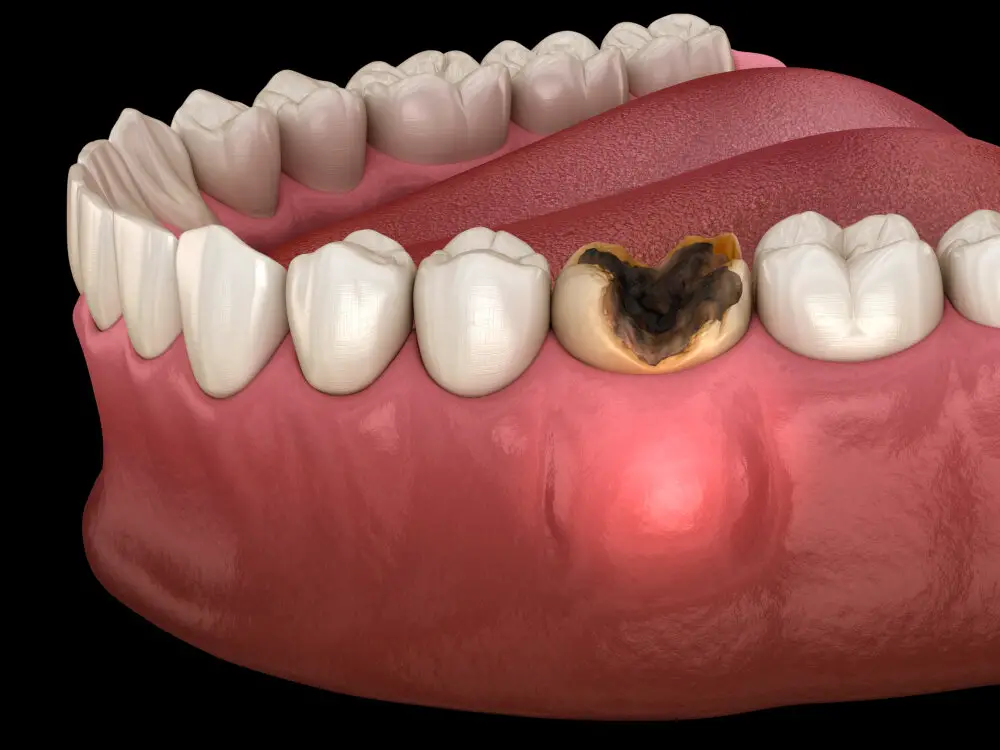
Gum disease, or periodontitis, is a chronic inflammatory disease that affects the gums and bones that support the teeth. It is caused by the accumulation of plaque and tartar on the teeth, which can lead to bacterial infection and inflammation. Gum disease is a common condition that affects millions of people worldwide, and if left untreated, it can lead to tooth loss and other serious health problems. The early stages of gum disease are often painless, which is why many people may not realize they have it until it has progressed to a more advanced stage. Symptoms of gum disease include red, swollen, and bleeding gums, bad breath, and loose teeth. If you suspect you have gum disease, it is important to see a dentist as soon as possible. Treatment for gum disease typically involves a deep cleaning of the teeth and gums to remove plaque and tartar. In more severe cases, surgery may be necessary to repair the damage caused by the disease. To prevent gum disease, it is important to practice good oral hygiene, such as brushing and flossing daily, and to see a dentist regularly for check-ups and cleanings.
Gum disease, also known as periodontal disease, is a bacterial infection that affects the gum tissue and bone that supports the teeth. It is caused by the buildup of plaque and tartar on the teeth and gum line, which can lead to inflammation and infection. The early stage of gum disease is called gingivitis, characterized by red, swollen, and bleeding gums. If left untreated, it can progress into periodontitis, which involves the destruction of the supporting bone and tissue, leading to tooth loss. Risk factors for gum disease include poor oral hygiene, smoking, genetics, certain medications, and underlying health conditions such as diabetes and autoimmune diseases. Treatment for gum disease may include professional cleaning, antibiotics, and surgical procedures in severe cases.
Gum disease, also known as periodontal disease, is caused by a buildup of plaque and bacteria on the teeth and gums. Poor oral hygiene, such as neglecting to brush and floss regularly, can lead to the development of plaque and tartar, which can irritate and inflame the gums. Other factors that can contribute to gum disease include smoking, hormonal changes, diabetes, and certain medications. When left untreated, gum disease can cause tooth loss and even affect overall health, as the bacteria can enter the bloodstream and travel to other parts of the body. Regular dental check-ups and proper oral hygiene can help prevent and treat gum disease.
Gum disease, also known as periodontitis, is a common oral health issue that can cause several symptoms. One of the most noticeable symptoms is bleeding gums, especially when brushing or flossing. You may also experience bad breath, swollen or tender gums, receding gums, and loose teeth. As the disease progresses, you may feel pain or sensitivity in your teeth, particularly when eating hot or cold foods. If left untreated, gum disease can cause permanent damage to your teeth and gums, leading to tooth loss and other serious health problems. Therefore, it’s important to seek treatment from a dentist as soon as possible if you’re experiencing any of these symptoms.
Remedies for gum disease vary depending on the severity of the condition. For mild cases, improving oral hygiene practices such as brushing and flossing regularly can help prevent further damage. In cases where the gum disease has progressed, a professional deep cleaning known as scaling and root planing may be necessary to remove plaque and tartar buildup. Antibacterial mouthwashes and antibiotics may also be prescribed to reduce inflammation and infection. In more severe cases, surgery may be required to repair damaged tissue and bone. It is important to seek prompt treatment for gum disease to prevent further complications and maintain good oral health.
Tooth Sensitivity

Tooth sensitivity is a common dental issue that affects millions of people worldwide. It is characterized by a sudden, sharp pain or discomfort in the teeth when exposed to certain stimuli such as hot or cold foods and drinks, sugary or acidic foods, and even cold air. Tooth sensitivity occurs when the protective layer of the teeth, known as enamel, wears away, exposing the underlying dentin layer. Dentin contains tiny tubules that lead to the nerve endings of the teeth, making them vulnerable to external stimuli. Tooth sensitivity can be caused by various factors, including aggressive brushing, gum recession, tooth decay, and teeth grinding, among others. If left untreated, tooth sensitivity can lead to more severe dental problems, such as tooth decay and gum disease. Fortunately, tooth sensitivity can be treated and prevented through various remedies and lifestyle changes. One of the most effective ways to reduce tooth sensitivity is to practice good oral hygiene by brushing twice a day with a soft-bristled toothbrush and fluoride toothpaste, flossing regularly, and using mouthwash. Avoiding acidic and sugary foods and drinks can also help prevent tooth sensitivity. Additionally, using desensitizing toothpaste, fluoride treatments, and dental sealants can help protect the teeth and reduce sensitivity. In more severe cases, dental procedures such as bonding, crowns, and root canal therapy can be done to address tooth sensitivity. By taking these preventive measures and seeking professional dental care, individuals can alleviate tooth sensitivity and maintain good oral health.
Tooth sensitivity is a common dental problem that causes discomfort or pain in the teeth when they are exposed to certain stimuli, such as hot or cold temperatures, acidic foods and drinks, or brushing and flossing. It occurs when the protective layer of enamel on the teeth wears down, exposing the underlying dentin and nerve endings. This can be caused by a variety of factors, including tooth decay, gum disease, teeth grinding, and harsh brushing techniques. Treatment for tooth sensitivity may include desensitizing toothpaste, fluoride treatments, dental fillings, or in severe cases, root canal therapy. It is important to address tooth sensitivity promptly to prevent further damage to the teeth and to maintain good oral health.
Tooth sensitivity is a common problem experienced by many people, and it is often caused by the erosion of the tooth enamel. This can happen due to a variety of factors, including poor dental hygiene, acidic foods and drinks, and grinding or clenching of the teeth. In addition, gum recession can also lead to tooth sensitivity, as the exposed root surfaces are more susceptible to pain and discomfort. Other potential causes of tooth sensitivity include dental procedures, such as fillings or crown placements, and certain medical conditions, such as gastroesophageal reflux disease (GERD) and bulimia. It is important to identify the underlying cause of tooth sensitivity in order to determine the best course of treatment, which may include changes in dental hygiene habits, dietary adjustments, or dental procedures.
Tooth sensitivity is a common dental problem that causes discomfort or pain in the teeth when exposed to certain stimuli such as hot or cold food and drinks, sweet or sour foods, and even cold air. The symptoms of tooth sensitivity can range from mild to severe and can be a sign of an underlying dental issue such as tooth decay, gum disease or a cracked tooth. Some of the common symptoms of tooth sensitivity include sharp or shooting pain in the teeth, discomfort while chewing, sensitivity to temperature changes, pain while brushing or flossing, and discomfort from sweet or acidic foods. If you experience any of these symptoms, it is important to visit your dentist for a proper diagnosis and treatment to prevent further damage to your teeth.
Tooth sensitivity can be a real pain, making it difficult to enjoy hot or cold foods and drinks. Fortunately, there are several remedies that can help alleviate the discomfort. One simple solution is to switch to a toothpaste designed for sensitive teeth, which contains ingredients that help block pain signals. Another option is to use a fluoride rinse or gel to strengthen the enamel and reduce sensitivity. Additionally, avoiding acidic foods and drinks, such as citrus fruits and soda, can help prevent further damage to the enamel. If the sensitivity is severe, a dental professional may recommend a desensitizing treatment or a filling to address any underlying issues. By taking steps to care for your teeth and seeking professional help when needed, you can find relief from tooth sensitivity and enjoy a more comfortable smile.
Dental Procedures
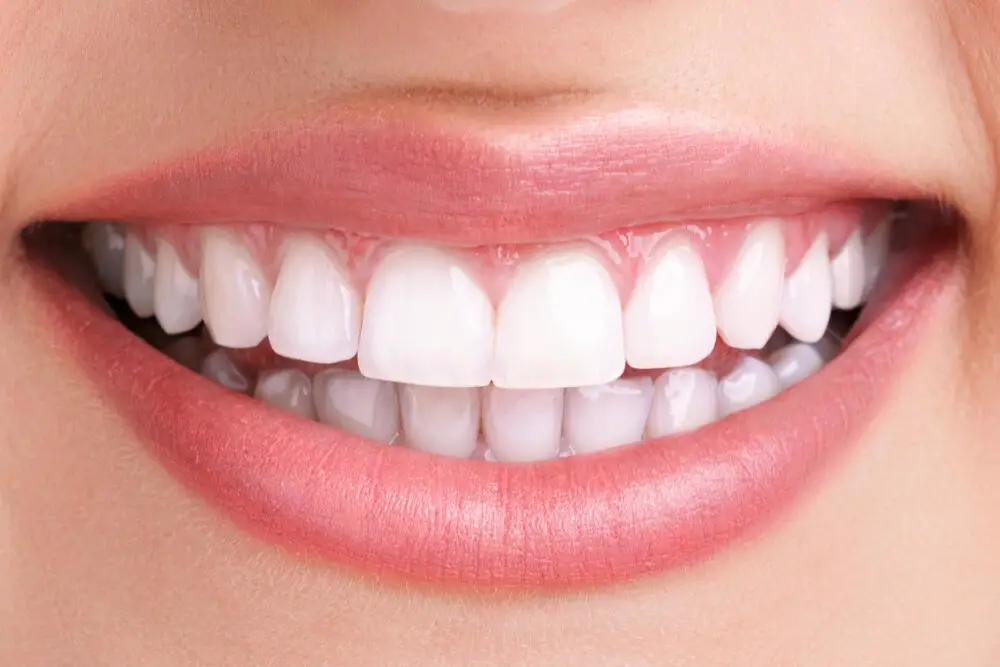
Dental procedures are a common solution to many oral health problems. Some of the most common dental procedures include fillings, root canals, and extractions. Fillings are used to treat cavities, which are areas of the tooth that have been damaged by decay. During a filling procedure, the dentist will remove the decayed portion of the tooth and fill it with a material such as composite resin or amalgam. Root canals are used to treat infections in the tooth’s pulp, which is the soft tissue inside the tooth. During a root canal procedure, the dentist will remove the infected pulp, clean the inside of the tooth, and fill it with a special material. Extractions are used to remove a tooth that cannot be saved, such as a tooth that has been severely damaged by decay or injury. Other dental procedures include crowns, bridges, and implants. Crowns are used to cover a damaged tooth and restore its shape and function. Bridges are used to replace one or more missing teeth by attaching a prosthetic tooth to the adjacent teeth. Implants are used to replace a missing tooth by inserting a small metal post into the jawbone and attaching a prosthetic tooth to the post. These procedures can help improve your oral health and restore your smile, but it’s important to consult with your dentist to determine which treatment option is best for you.
Dental procedures can cause tooth pain due to a variety of reasons. One of the most common causes is the use of dental tools during the procedure, which can irritate or damage the tissues surrounding the tooth. Additionally, the procedure may involve removing decayed or damaged parts of the tooth, which can expose the sensitive inner layers of the tooth to air, food, and drink. This can lead to temporary or prolonged tooth sensitivity and pain. In some cases, dental procedures may also cause nerve damage or infection, which can result in severe and persistent tooth pain. It is important to consult with a dental professional if you experience tooth pain after a procedure to determine the underlying cause and receive appropriate treatment.
There are several common dental procedures that can cause tooth pain. One of the most common causes is a filling that is too high, which can result in an uneven bite and put pressure on the tooth. Another common cause is a root canal, which removes the nerve from the tooth and can lead to sensitivity or pain. Braces, retainers, and other orthodontic devices can also cause tooth pain as they shift the teeth into proper alignment. Finally, teeth whitening treatments can cause sensitivity and pain as the chemicals used can irritate the nerves in the teeth. If you experience tooth pain after a dental procedure, it’s important to consult with your dentist to determine the cause and find the appropriate remedy.
Tooth pain after dental procedures can be quite uncomfortable, but there are several remedies that can help alleviate the discomfort. Firstly, over-the-counter pain medication such as ibuprofen or acetaminophen can be effective in reducing inflammation and pain. Additionally, placing a cold compress on the affected area for 15-20 minutes at a time can also help reduce swelling and numb the nerve endings. Rinsing the mouth with warm salt water can help disinfect the area and promote healing. It is also important to avoid hard or crunchy foods that can irritate the area and to practice good oral hygiene to prevent infection. If the pain persists or worsens, it is important to follow up with your dentist to ensure proper healing and any necessary treatment.
Tooth pain can be caused by a variety of factors, including tooth decay, gum disease, tooth grinding, and injury. Poor oral hygiene and consuming sugary or acidic foods and drinks can also contribute to tooth pain. Fortunately, there are several remedies that can alleviate tooth pain, depending on the cause. These include using over-the-counter pain relievers, applying a cold compress to the affected area, practicing good oral hygiene, avoiding sugary and acidic foods, and wearing a mouthguard at night to prevent tooth grinding. In more severe cases, a dentist may need to perform a root canal or extraction to address the underlying issue. Proper dental care and regular check-ups can also help prevent tooth pain from occurring in the first place.
It is crucial to seek dental care if tooth pain persists as it could indicate an underlying dental problem. Ignoring tooth pain or attempting to self-medicate can exacerbate the issue, leading to more severe and costly dental procedures in the future. Tooth pain can be caused by a variety of factors, including cavities, gum disease, or even a cracked tooth, all of which require professional dental attention. Seeking prompt dental care can not only alleviate the pain but also prevent further damage to the affected tooth or surrounding teeth. Regular dental check-ups and cleanings can also help identify and address any potential dental issues before they cause pain and discomfort.
In conclusion, maintaining good dental health is crucial to prevent tooth pain and other dental problems. Regular brushing and flossing, as well as visiting your dentist for routine check-ups, are essential for keeping your teeth and gums healthy. Additionally, avoiding sugary and acidic foods and drinks can help prevent tooth decay and erosion. If you experience tooth pain, it is important to identify the cause and seek treatment promptly to prevent further damage. In some cases, lifestyle changes such as reducing stress and quitting smoking can also improve dental health. By taking care of your teeth and gums and addressing any issues promptly, you can enjoy a healthy, pain-free smile for years to come.
Conclusion
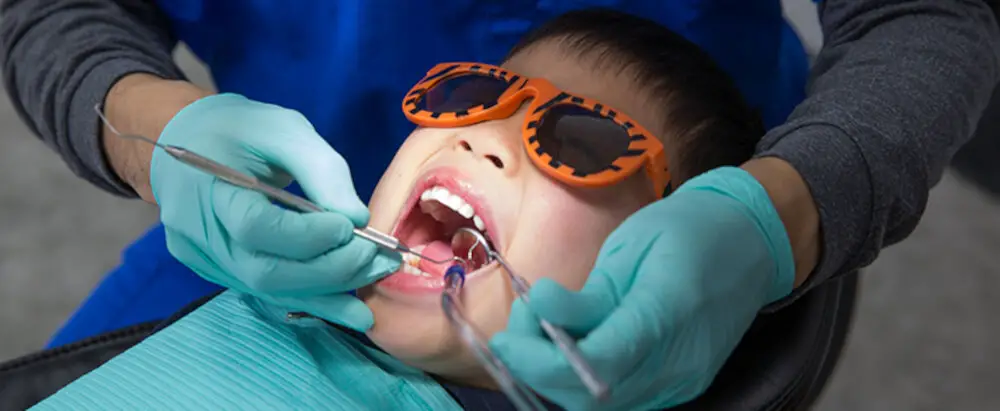
In conclusion, tooth pain can be a debilitating and uncomfortable experience that can have a significant impact on your daily life. Understanding the root causes of tooth pain and implementing effective remedies can help alleviate the discomfort and promote better oral health. From poor dental hygiene to underlying health conditions, there are a variety of factors that can contribute to tooth pain. By taking a proactive approach to dental care and seeking professional help when necessary, you can minimize the likelihood of experiencing tooth pain and maintain a healthy, pain-free smile. Whether it’s regular brushing and flossing or seeking the advice of a dentist, taking care of your teeth is essential for your overall well-being.

